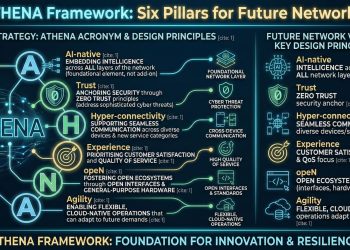South Korea’s leading mobile carrier, KT Corp., has introduced an artificial intelligence model known as “Mi:dm” as part of its strategy to expand AI operations across various sectors. It includes manufacturing, finance, education, and the public domain, both within South Korea and in the global market.
Mi:dm is the first large-scale language model (LLM) developed by a Korean company, trained on a dataset of more than 1 trillion tokens, the fundamental building blocks of text-based LLMs.
The launch includes a range of models, from lightweight versions to extra-large ones, providing companies the flexibility to tailor models to their specific needs.
KT envisions leveraging Mi:dm to advance its information and communication technology (ICT) business and develop application services in collaboration with external partners, aiming for growth and anticipating sales of 100 billion won within the next three years.
Mi:dm, the newly unveiled AI model by KT, offers a range of four distinct models catering to diverse needs. These options encompass the “Basic” version, comprising approximately 7 billion parameters, and the “Large” version, equipped with around 200 billion parameters.
Parameters play a key role in determining a model’s capacity and capabilities. To put it in context, KT’s Mi:dm surpasses the U.S.-based OpenAI’s GPT-3 model, renowned for generating human-like text, which contains 175 billion parameters.
KT’s strategic vision includes making the “Basic” model of Mi:dm available to other companies, further extending its reach and influence. The telecom giant plans to offer comprehensive AI development packages, including access to KT Cloud’s extensive AI computing services and support from the AI chip startup Rebellions, which provides neural processing unit infrastructure.
With the new launch, KT aims to address the “hallucination phenomenon,” a common issue with generative AI models. The company has developed three key technologies, namely, Document AI, Search AI, and Factguard AI, which collectively reduce AI hallucinations by up to 70% compared to other generative AI services.
Document AI enhances Mi:dm’s ability to comprehend and process complex documents, Search AI employs deep learning technology for real-time information retrieval, and Factguard AI ensures responses are based solely on the original document, ensuring greater accuracy and reliability in AI-generated content.
The Search AI technology leverages deep learning to swiftly retrieve the most up-to-date information, ensuring that users can access the latest insights efficiently.
Furthermore, Factguard AI is a reliability booster by generating responses based on the original source material, minimizing the chances of AI-generated inaccuracies.
KT is planning to collaborate with different AI startups, including Upstage. By extending accessibility to its Foundation Model of Faith through the KT Mi:dm Studio portal, the company has enabled other organizations to learn from the capabilities of super-large AI models. A foundation model rooted in extensive data serves as a core AI model analogous to OpenAI’s GPT and offers flexibility for customizing AI services and applications to suit specific business needs.
More from Korea Tech Daily:
- Samsung Unveils 2024 Generative AI Roadmap for Home Appliances
- Korea Establishes First National Standard for AI Ethics in Response to Generative AI Technology
- Samsung Electronics temporarily bans ChatGPT and other generative AI tools for employees
- Naver Cloud Finance Day 2023: Showcasing Financial AI Innovation Cases Using HyperclovaX
- Telecom Giants SK Telecom and Deutsche Telekom Collaborate on AI Language Model







